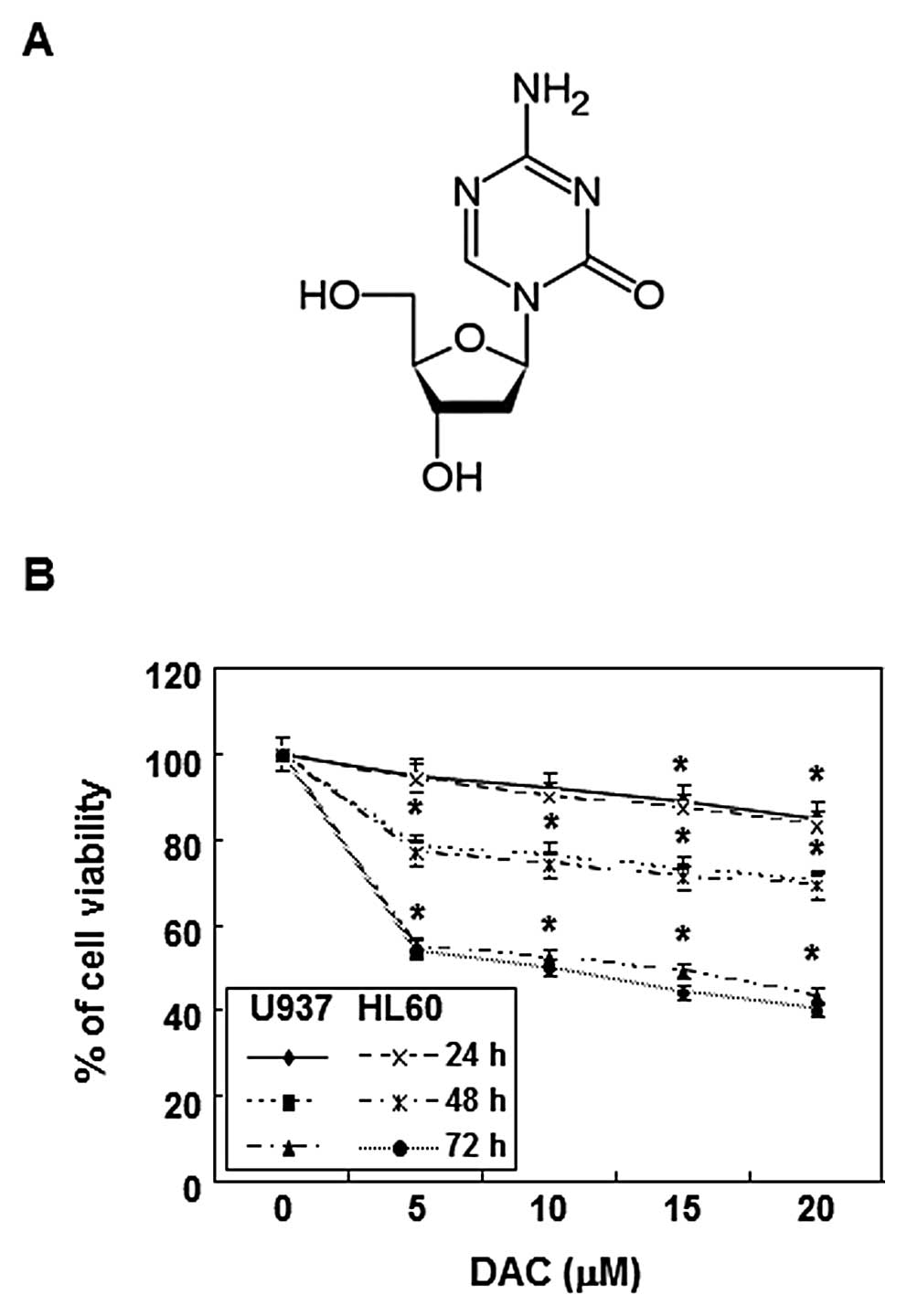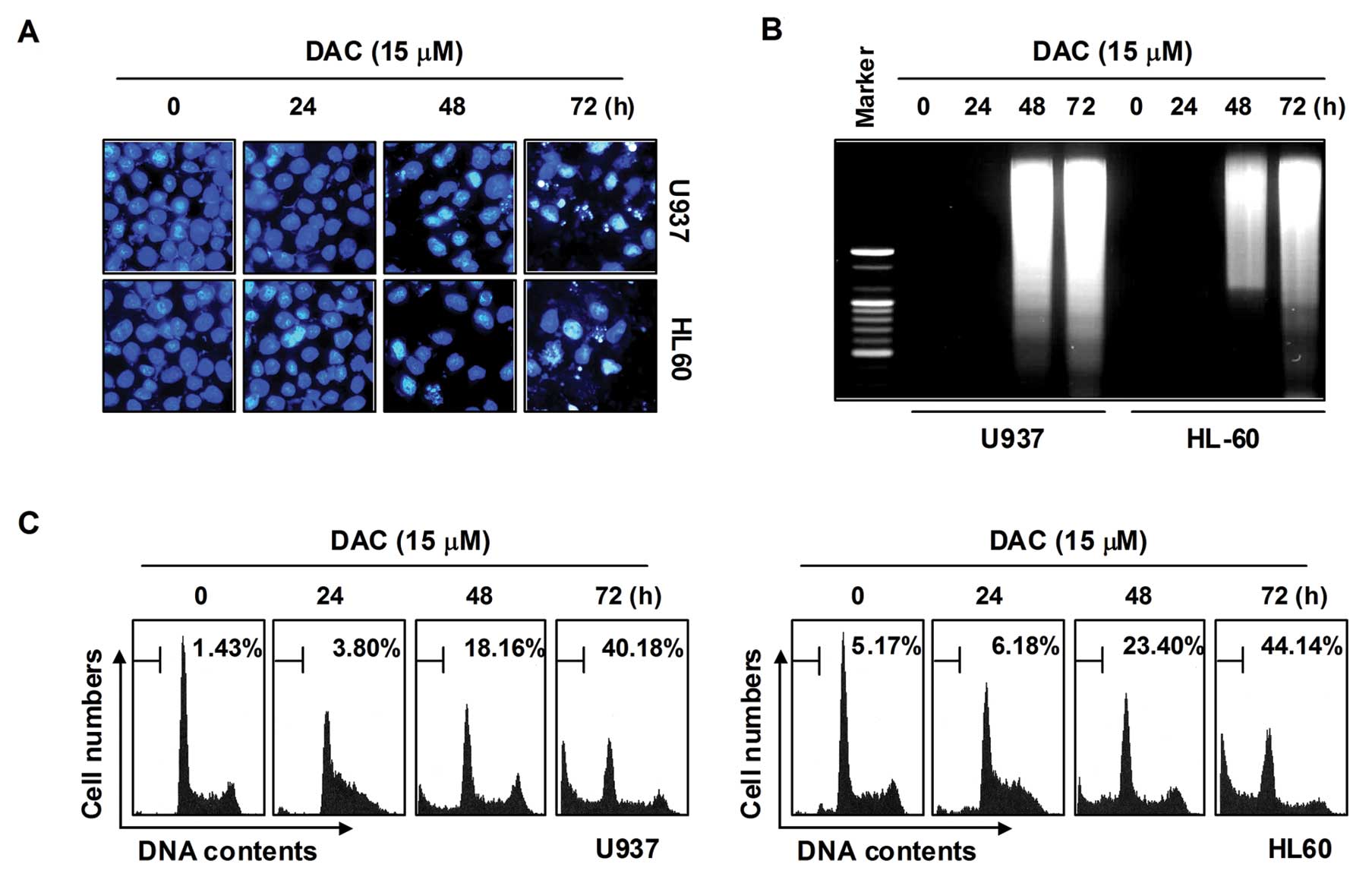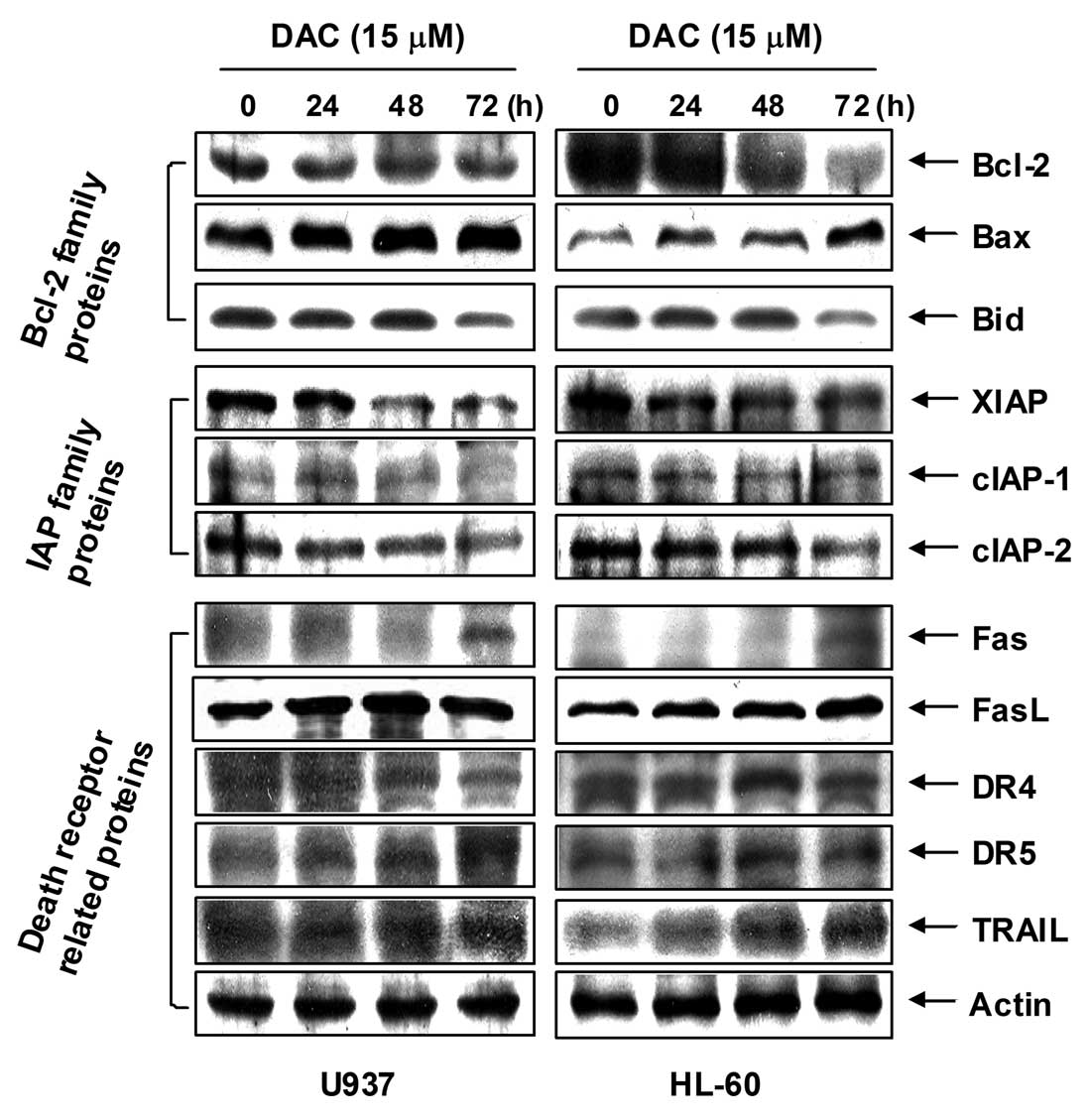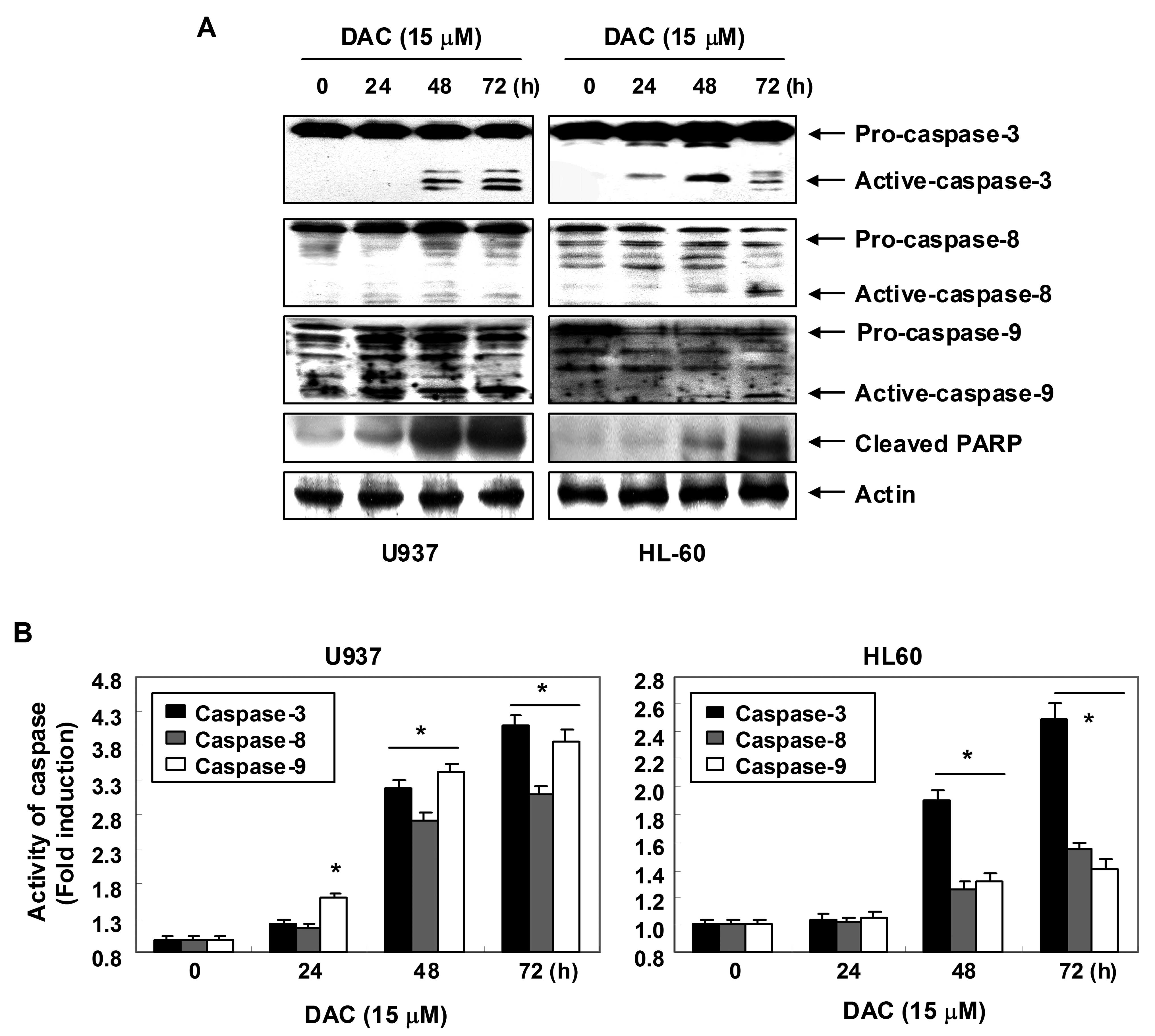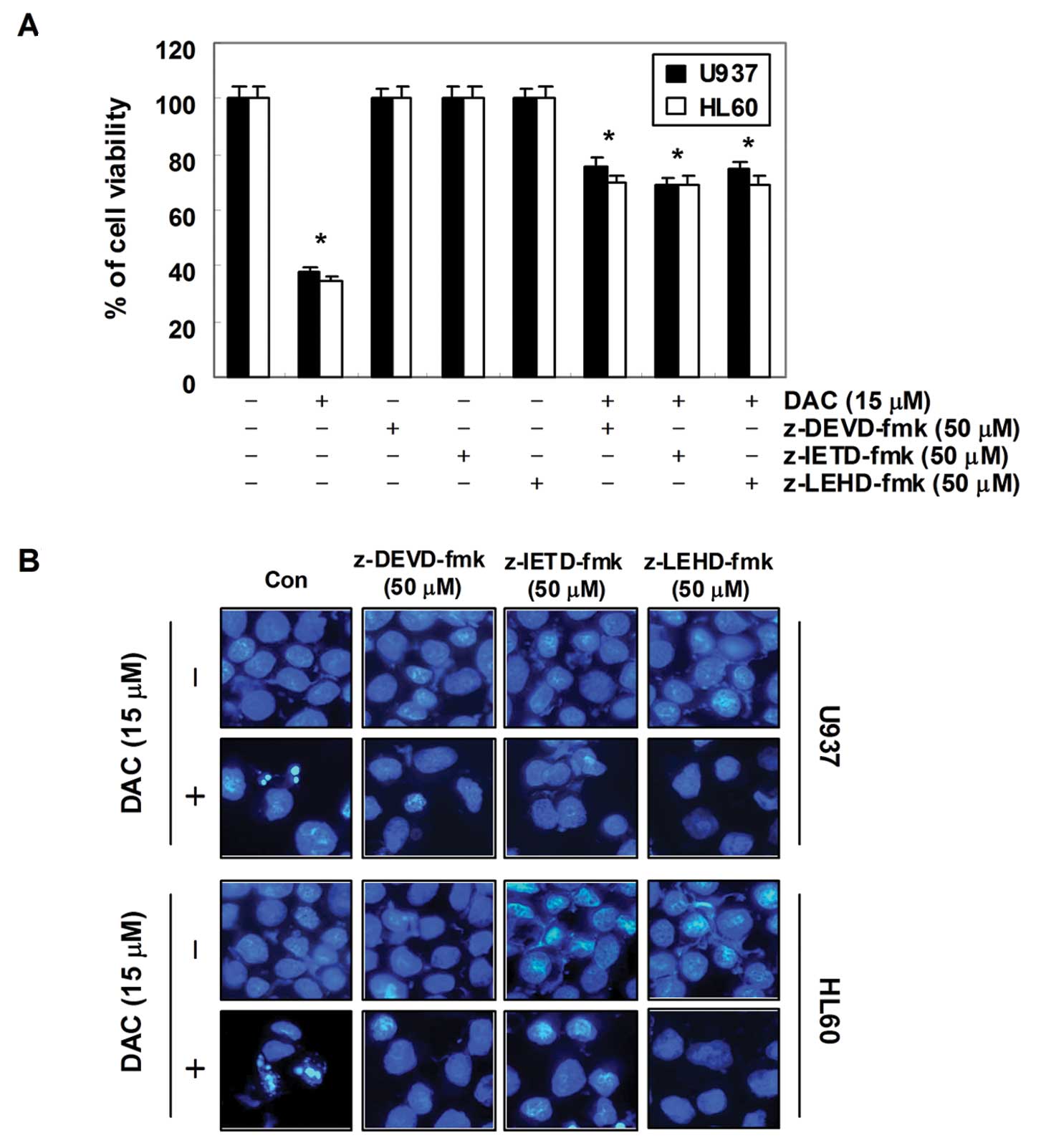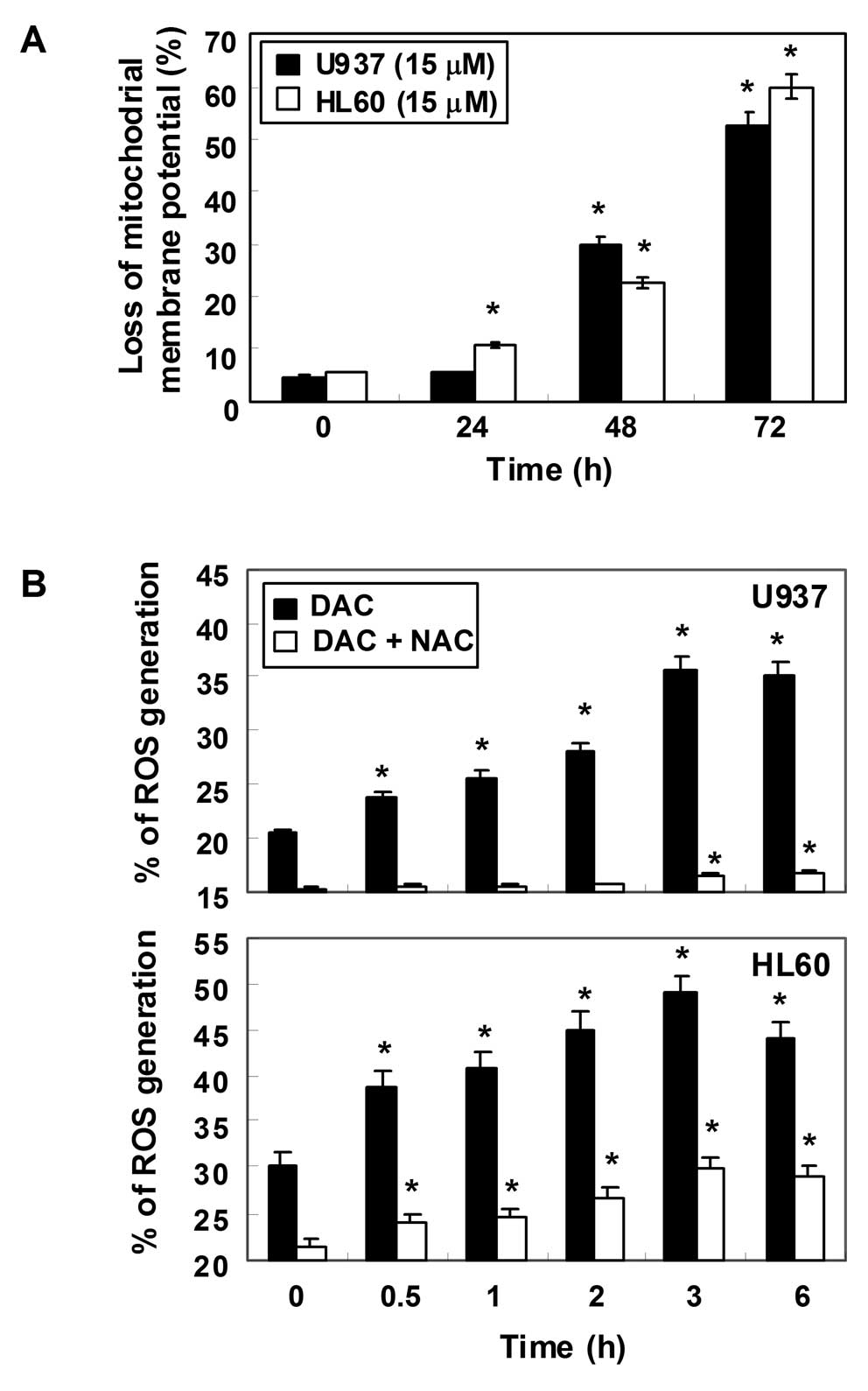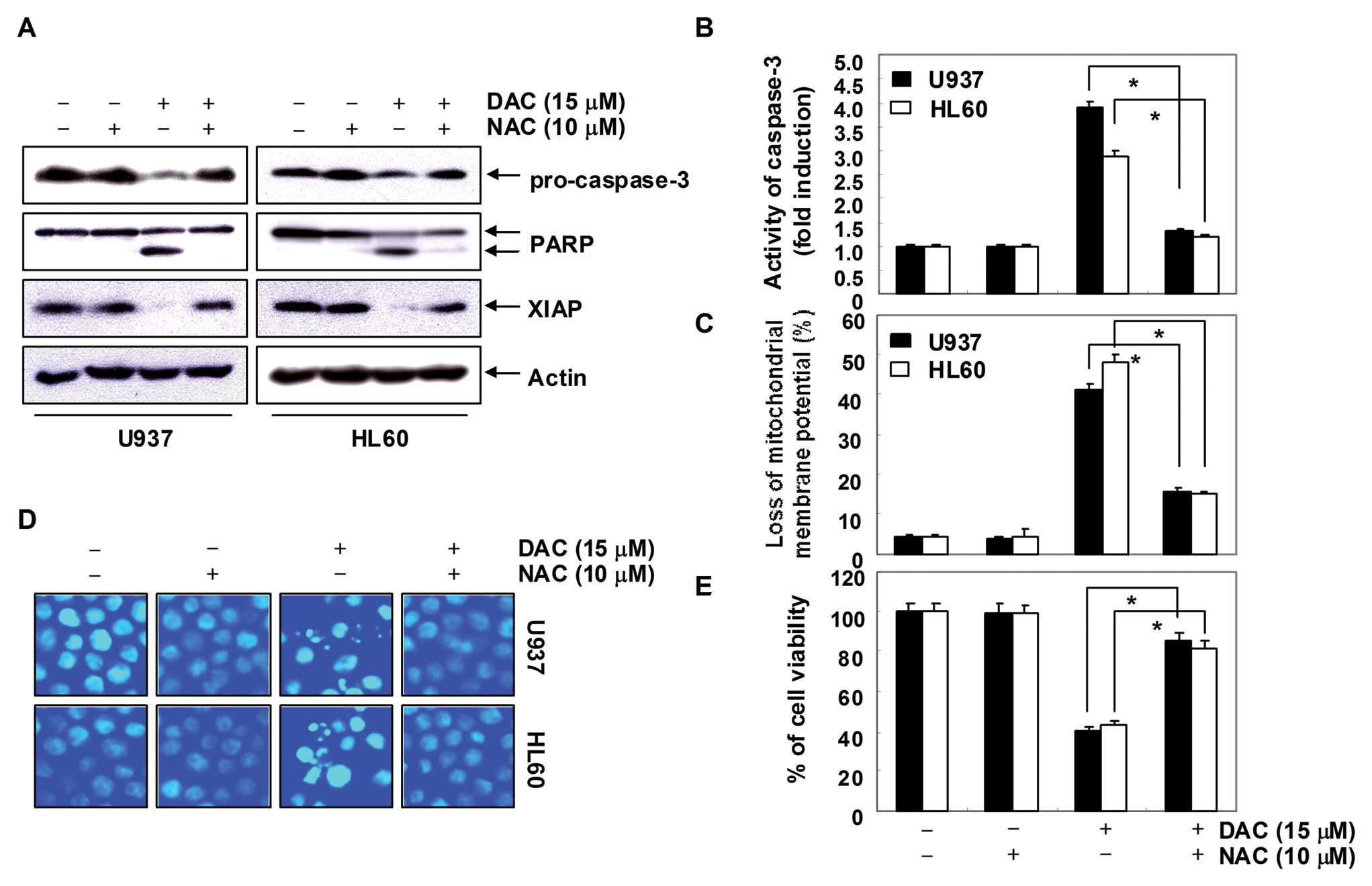|
1.
|
Chang H, Lin H, Yi L, Zhu J, Zhou Y, Mi M
and Zhang Q: 3,6-Dihydroxyflavone induces apoptosis in leukemia
HL-60 cells via reactive oxygen species-mediated p38 MAPK/JNK
pathway. Eur J Pharmacol. 648:31–38. 2010. View Article : Google Scholar : PubMed/NCBI
|
|
2.
|
Abramson N and Melton B: Leukocytosis:
basics of clinical assessment. Am Fam Physician. 62:2053–2060.
2000.PubMed/NCBI
|
|
3.
|
Gilliland DG, Jordan CT and Felix CA: The
molecular basis of leukemia. Hematology Am Soc Hematol Educ
Program. 80–97. 2004. View Article : Google Scholar
|
|
4.
|
Green DR and Reed JC: Mitochondria and
apoptosis. Science. 281:1309–1312. 1998. View Article : Google Scholar : PubMed/NCBI
|
|
5.
|
Siegelin MD, Habel A and Gaiser T: 17-AAG
sensitized malignant glioma cells to death-receptor mediated
apoptosis. Neurobiol Dis. 33:243–249. 2009. View Article : Google Scholar : PubMed/NCBI
|
|
6.
|
Lazebnik YA, Kaufmann SH, Desnoyers S,
Poirier GG and Earnshaw WC: Cleavage of poly(ADP-ribose) polymerase
by a proteinase with properties like ICE. Nature. 371:346–347.
1994. View
Article : Google Scholar : PubMed/NCBI
|
|
7.
|
Jin Z and El-Deiry WS: Overview of cell
death signaling pathways. Cancer Biol Ther. 4:139–163.
2005.PubMed/NCBI
|
|
8.
|
Li H, Zhu H, Xu CJ and Yuan J: Cleavage of
BID by caspase 8 mediates the mitochondrial damage in the Fas
pathway of apoptosis. Cell. 94:491–501. 1998. View Article : Google Scholar : PubMed/NCBI
|
|
9.
|
Luo X, Budihardjo I, Zou H, Slaughter C
and Wang X: Bid, a bcl-2 interacting protein, mediates cytochrome c
release from mitochondria in response to activation of cell surface
death receptors. Cell. 94:481–490. 1998. View Article : Google Scholar : PubMed/NCBI
|
|
10.
|
Dlugosz PJ, Billen LP, Annis MG, Zhu W,
Zhang Z, Lin J, Leber B and Andrews DW: Bcl-2 changes conformation
to inhibit Bax oligomerization. EMBO J. 25:2287–2296. 2006.
View Article : Google Scholar : PubMed/NCBI
|
|
11.
|
Park C, Jin CY, Kwon HJ, Hwang HJ, Kim GY,
Choi IW, Kwon TK, Kim BW, Kim WJ and Choi YH: Induction of
apoptosis by esculetin in human leukemia U937 cells: roles of Bcl-2
and extracellular-regulated kinase signaling. Toxicol In Vitro.
24:486–494. 2010. View Article : Google Scholar : PubMed/NCBI
|
|
12.
|
De Laurenzi V and Melino G: Apoptosis. The
little devil of death. Nature. 406:135–136. 2000.PubMed/NCBI
|
|
13.
|
Gao Z, Tian Y, Wang J, Yin Q, Wu H, Li YM
and Jiang X: A dimeric Smac/diablo peptide directly relieves
caspase-3 inhibition by XIAP. Dynamic and cooperative regulation of
XIAP by Smac/Diablo. J Biol Chem. 282:30718–30727. 2007. View Article : Google Scholar : PubMed/NCBI
|
|
14.
|
Crack PJ and Taylor JM: Reactive oxygen
species and the modulation of stroke. Free Radic Boil Med.
38:1433–1444. 2005. View Article : Google Scholar : PubMed/NCBI
|
|
15.
|
Fiers W, Beyaert R, Declercq W and
Vandenabeele P: More than one way to die: apoptosis, necrosis and
reactive oxygen damage. Oncogene. 18:7719–7730. 1999. View Article : Google Scholar : PubMed/NCBI
|
|
16.
|
Skulachev VP: Bioenergetic aspects of
apoptosis, necrosis and mitoptosis. Apoptosis. 11:473–485. 2006.
View Article : Google Scholar : PubMed/NCBI
|
|
17.
|
Chakraborti T, Das S, Mondal M,
Roychoudhury S and Chakraborti S: Oxidant, mitochondria and
calcium: an overview. Cell Signal. 11:77–85. 1999. View Article : Google Scholar : PubMed/NCBI
|
|
18.
|
Choi WY, Kim GY, Lee WH and Choi YH:
Sanguinarine, a benzophenanthridine alkaloid, induces apoptosis in
MDA-MB-231 human breast carcinoma cells through a reactive oxygen
species-mediated mitochondrial pathway. Chemotherapy. 54:279–287.
2008. View Article : Google Scholar
|
|
19.
|
Robertson KD: DNA methylation and human
disease. Nat Rev Genet. 6:597–610. 2005. View Article : Google Scholar : PubMed/NCBI
|
|
20.
|
Watanabe Y and Maekawa M: Methylation of
DNA in cancer. Adv Clin Chem. 52:145–167. 2010. View Article : Google Scholar
|
|
21.
|
Jones PA and Taylor SM: Cellular
differentiation, cytidine analogs and DNA methylation. Cell.
20:85–93. 1980. View Article : Google Scholar : PubMed/NCBI
|
|
22.
|
Bender CM, Pao MM and Jones PA: Inhibition
of DNA methylation by 5-aza-2′-deoxycytidine suppresses the growth
of human tumor cell lines. Cancer Res. 58:95–101. 1998.
|
|
23.
|
Karpf AR and Jones DA: Reactivating the
expression of methylation silenced genes in human cancer. Oncogene.
21:5496–5503. 2002. View Article : Google Scholar : PubMed/NCBI
|
|
24.
|
Kihslinger JE and Godley LA: The use of
hypomethylating agents in the treatment of hematologic
malignancies. Leuk Lymphoma. 48:1676–1695. 2007. View Article : Google Scholar : PubMed/NCBI
|
|
25.
|
Santos FP, Kantarjian H, Garcia-Manero G,
Issa JP and Ravandi F: Decitabine in the treatment of
myelodysplastic syndromes. Expert Rev Anticancer Ther. 10:9–22.
2010. View Article : Google Scholar : PubMed/NCBI
|
|
26.
|
Robak T: New nucleoside analogs for
patients with hematological malignancies. Expert Opin Investig
Drugs. 20:343–359. 2011. View Article : Google Scholar : PubMed/NCBI
|
|
27.
|
Issa JP and Kantarjian HM: Targeting DNA
methylation. Clin Cancer Res. 15:3938–3946. 2009. View Article : Google Scholar
|
|
28.
|
Boumber Y and Issa JP: Epigenetics in
cancer: what’s the future? Oncology. 25:220–206. 2011.
|
|
29.
|
Hurtubise A and Momparler RL: Effect of
histone deacetylase inhibitor LAQ824 on antineoplastic action of
5-Aza-2′-deoxycytidine (decitabine) on human breast carcinoma
cells. Cancer Chemother Pharmacol. 58:618–625. 2006.PubMed/NCBI
|
|
30.
|
Valdez BC, Li Y, Murray D, Corn P,
Champlin RE and Andersson BS: 5-Aza-2′-deoxycytidine sensitizes
busulfan-resistant myeloid leukemia cells by regulating expression
of genes involved in cell cycle checkpoint and apoptosis. Leuk Res.
34:364–372. 2010.
|
|
31.
|
Ng KP, Ebrahem Q, Negrotto S, Mahfouz RZ,
Link KA, Hu Z, Gu X, Advani A, Kalaycio M, Sobecks R, et al: p53
independent epigenetic-differentiation treatment in xenotransplant
models of acute myeloid leukemia. Leukemia. 25:1739–1750. 2011.
View Article : Google Scholar : PubMed/NCBI
|
|
32.
|
Festuccia C, Gravina GL, D’Alessandro AM,
Millimaggi D, Di Rocco C, Dolo V, Ricevuto E, Vicentini C and
Bologna M: Downmodulation of dimethyl transferase activity enhances
tumor necrosis factor-related apoptosis-inducing ligand-induced
apoptosis in prostate cancer cells. Int J Oncol. 33:381–388.
2008.
|
|
33.
|
Deng T and Zhang Y: 5-Aza-2′-deoxycytidine
reactivates expression of RUNX3 by deletion of DNA
methyltransferases leading to caspase independent apoptosis in
colorectal cancer Lovo cells. Biomed Pharmacother. 63:492–500.
2009.
|
|
34.
|
Capper D, Gaiser T, Hartmann C, Habel A,
Mueller W, Herold-Mende C, von Deimling A and Siegelin MD:
Stem-cell-like glioma cells are resistant to TRAIL/Apo2L and
exhibit down-regulation of caspase-8 by promoter methylation. Acta
Neuropathol. 117:445–456. 2009. View Article : Google Scholar : PubMed/NCBI
|
|
35.
|
Ruiz-Magaña MJ, Rodríguez-Vargas JM,
Morales JC, Saldivia MA, Schulze-Osthoff K and Ruiz-Ruiz C: The DNA
methyltransferase inhibitors zebularine and decitabine induce
mitochondria-mediated apoptosis and DNA damage in p53 mutant
leukemic T cells. Int J Cancer. 130:1195–1207. 2012.PubMed/NCBI
|
|
36.
|
Kim SY, Kang HT, Choi HR and Park SC:
Biliverdin reductase A in the prevention of cellular senescence
against oxidative stress. Exp Mol Med. 43:15–23. 2011. View Article : Google Scholar : PubMed/NCBI
|
|
37.
|
Choi JH, Choi AY, Yoon H, Choe W, Yoon KS,
Ha J, Yeo EJ and Kang I: Baicalein protects HT22 murine hippocampal
neuronal cells against endoplasmic reticulum stress-induced
apoptosis through inhibition of reactive oxygen species production
and CHOP induction. Exp Mol Med. 42:811–822. 2010. View Article : Google Scholar
|
|
38.
|
Jeong JH, Ryu DS, Suk DH and Lee DS:
Anti-inflammatory effects of ethanol extract from Orostachys
japonicus on modulation of signal pathways in LPS-stimulated RAW
264.7 cells. BMB Rep. 44:399–404. 2011. View Article : Google Scholar : PubMed/NCBI
|
|
39.
|
Hengartner MO: The biochemistry of
apoptosis. Nature. 407:770–776. 2000. View Article : Google Scholar : PubMed/NCBI
|
|
40.
|
Lin CT, Lin WH, Lee KD and Tzeng PY: DNA
mismatch repair as an effector for promoting phorbol ester-induced
apoptotic DNA damage and cell killing: implications in tumor
promotion. Int J Cancer. 119:1776–1784. 2006. View Article : Google Scholar : PubMed/NCBI
|
|
41.
|
Brodská B and Holoubek A: Generation of
reactive oxygen species during apoptosis induced by DNA-damaging
agents and/or histone deacetylase inhibitors. Oxid Med Cell Longev.
2011:2535292011.PubMed/NCBI
|
|
42.
|
Hell K, Saleh M, Crescenzo GD,
O’Connor-McCourt MD and Nicholson DW: Substrate cleavage by
caspases generates protein fragments with Smac/Diablo-like
activities. Cell Death Differ. 10:1234–1239. 2003. View Article : Google Scholar : PubMed/NCBI
|
|
43.
|
Choi YE, Butterworth M, Malladi S, Duckett
CS, Cohen GM and Bratton SB: The E3 ubiquitin ligase cIAP1 binds
and ubiquitinates caspase-3 and -7 via unique mechanisms at
distinct steps in their processing. J Biol Chem. 284:12772–12782.
2009. View Article : Google Scholar : PubMed/NCBI
|
|
44.
|
Fleury C, Mignotte B and Vayssière JL:
Mitochondrial reactive oxygen species in cell death signaling.
Biochimie. 84:131–141. 2002. View Article : Google Scholar : PubMed/NCBI
|















